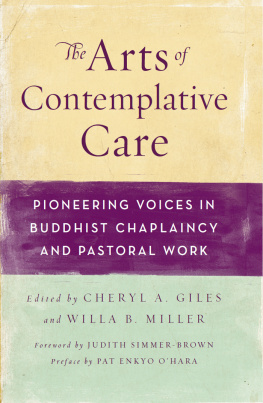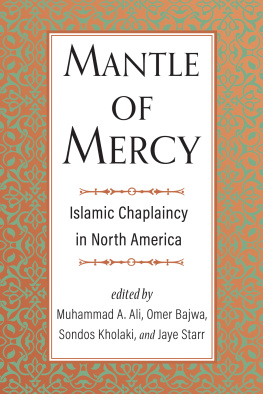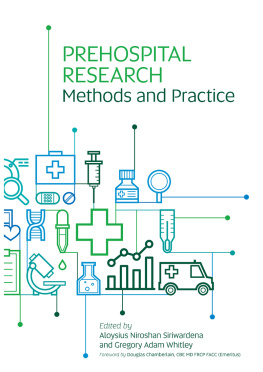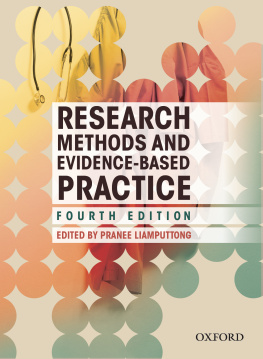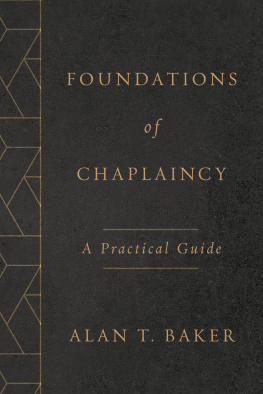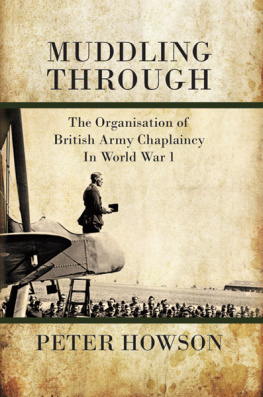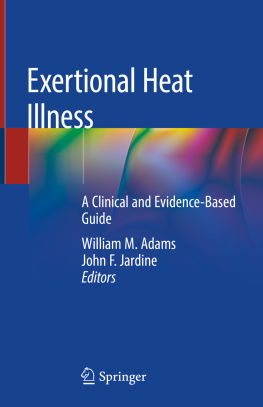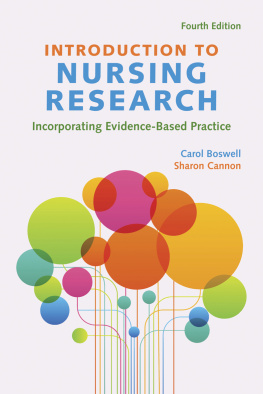Copyright 2021 Wipf and Stock Publishers. All rights reserved. Except for brief quotations in critical publications or reviews, no part of this book may be reproduced in any manner without prior written permission from the publisher. Write: Permissions, Wipf and Stock Publishers, W. th Ave., Suite , Eugene, OR 97401 .
W. th Ave., Suite
Names: Fitchett, George, 1948 , author. | Nolan, Steve, editor | Damen, Annelieke, editor | Cadge, Wendy, foreword writer
Title: Transforming chaplaincy : the George Fitchett reader / edited by Steve Nolan and Annelieke Damen.
Description: Eugene, OR: Pickwick Publications, 2021 | Series: Transforming Chaplaincy | Includes bibliographical references and index.
Identifiers: isbn 978-1-7252-9451-6 ( paperback ) | isbn 978-1-7252-9452-3 ( hardcover ) | isbn 978-1-7252-9453-0 ( ebook )
Subjects: LCSH: Fitchett, George, 1948 | Chaplains, Hospital | MedicineReligious aspects | Pastoral care | Pastoral counseling | Pastoral theology | Spiritual life | Models, Theoretical | Counseling
Permissions
American Psychological Association
G. Fitchett, B. D. Rybarczyk, G. A. DeMarco, and J. J. Nicholas. 1999 . The Role of Religion in Medical Rehabilitation Outcomes: A Longitudinal Study. Rehabilitation Psychology :, .
Journal of Pastoral Care and Counseling
G. Fitchett, P. Meyer, and L. A. Burton. 2000 . Spiritual Care in the Hospital: Who Requests It? Who Needs It? Journal of Pastoral Care and Counseling :, .
SAGE
G. Fitchett, P. E. Murphy, J. Kim, J. L. Gibbons, J. R. Cameron, and J. A. Davis. 2004 . Religious Struggle: Prevalence, Correlates and Mental Health Risks in Diabetic, Congestive Heart Failure, and Oncology Patients. International Journal of Psychiatry in Medicine :, .
Oxford University Press
A. L. Canada, P. E. Murphy, G. Fitchett, and K. Stein. 2016 . Re-examining the Contributions of Faith, Meaning, and Peace to Quality of Life: A Report from the American Cancer Societys Studies of Cancer SurvivorsII (SCSII). Annals of Behavioral Medicine :, .
Journal of Supervision and Training in Ministry
G. Fitchett. 1998 1999 . CPE and Spiritual Growth. Journal of Supervision and Training in Ministry :. Reprinted in Expanding the Circle: Essays in Honor of Joan Hemenway edited by C. F. Garlid, A. A. Zollfrank, and G. Fitchett, . Decatur, GA: Journal of Pastoral Care, 2009 .
Taylor & Francis
G. Fitchett. 2011 . Making Our Case(s). Journal of Health Care Chaplaincy :, .
Taylor & Francis
G. Fitchett and D. Grossoehme. 2012 . Health Care Chaplaincy as a Research-Informed Profession. In Professional Spiritual and Pastoral Care: A Practical Clergy and Chaplains Handbook edited by S. Roberts, . Woodstock, VY: SkyLight Paths.
The George Washington Institute for Spirituality and Health
G. Fitchett and P. A. Roberts. 2003 . In the Garden with Andrea: Spiritual Assessment in End of Life Care. In Walking Together: Physicians, Chaplains and Clergy Caring for the Sick edited by C. M. Puchalski, . Washington, DC: The George Washington Institute for Spirituality and Health.
Journal of Pastoral Care and Counseling
G. Fitchett and J. Risk. 2009 . Screening for Spiritual Struggle. Journal of Pastoral Care and Counseling :, .
Mary Ann Liebert
G. Fitchett, A. L. H. Pierson, C. Hoffmeyer, D. Labuschagne, A. Lee, S. Levine, S. OMahony, K. Pugliese, and N. Waite. 2019 . Development of the PC, a Quantiable Assessment of Spiritual Concerns of Patients Receiving Palliative Care Near the End of Life. Journal of Palliative Medicine .
Foreword
I t was July of 2016 and we were in a conference room at Rush University. We were surrounded by chaplains from across the country in the process of becoming chaplaincy researchers. The first cohort of eight Transforming Chaplaincy Fellows had just finished their first year of research-based masters degree programs and the second cohort would be starting in the fall. Gathered for a conference, we were tired after a long day and looking forward to dinner.
George was putting away the small black clock he uses to keep time during conference panels. Rather than packing up and heading outside for some fresh air, many of us clustered in small groups working on projects. I remember thinking that this break looked more like a study-hall, and then realizing that this cohort of people, passionate about using research to improve the work of chaplains, was doing exactly what George and I envisioned when we wrote the grant proposal that funded the first phase of the Transforming Chaplaincy Project. We were building a stronger research-base for the field, creating a leadership pipeline to support it, and collaborating all along the way.
What I most remember about this scene, though, is George. Not sitting with any one group, he moved among us because we all wanted his attention and needed his help. He suggested references to one group, looked at rough drafts of tables with another, and brainstormed with a thirdthe leading chaplaincy researcher and teacher doing his craft.
Georges journey to this role was far from linear. He was an undergraduate sociology major at Rutgers University, interested in research and advised by the department chair in the mid- 1960 s to join the Society for the Scientific Study of Religion. He was a staff chaplain and then ACPE Supervisor at Rush University Medical Center, reading articles by Ken Pargament about religious coping in the Journal for the Scientific Study of Religion and going to grand rounds sponsored by the Department of Psychology and the Department of Psychiatry, where it was taken for granted that research improved clinical practice.
In 1990 , new leadership in the Department of Religion, Health and Human Values at Rush made it possible for George to begin to do research half-time in collaboration, with experienced health psychologists he knew from clinical work there. He encouraged them to add questions about religion and spirituality to the surveys they conducted with patients with serious illnesses, and he began to develop measures and contribute to the growing field of psycho-oncology. With the mentoring of Rush colleagues, Lynda Powell, a psychologist in the Department of Preventive Medicine, and Carlos Mendes de Leon, an epidemiologist in the Institute for Aging, George continued to do research and received a National Institutes of Health Career Development (K) Award that enabled him, in 2007 , to complete a PhD at the University of Illinois-Chicagos School of Public Health in Epidemiology, focused on religion and cardiovascular health.
George was the first chaplain to get a research-focused PhD, and his work has become central to the field of chaplaincy research. Support from the Department of Religion, Health and Human Values at Rush was essentialthis was not a field that could be built by chaplains with full-time jobs in their free time at night and on the weekendsas were collaborations with colleagues in psychology, sociology, and medicine both locally and nationally. As George remembers, there was an immense amount of doubt along the way, which made collaborations with colleagues all the more important.


